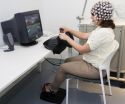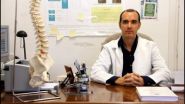(Press-News.org) Climate change is predicted to have major impacts on the many species that call our rocky shorelines home. Indeed, species living in these intertidal habitats, which spend half their day exposed to air and the other half submerged by water, may be subjected to a double whammy as both air and water temperatures rise. Given the reliance of human society on nearshore coastal ecosystems, it is critical that we better understand how climate change will affect them.
In a recent study published in Global Change Biology, Northeastern University professor Geoffrey C. Trussell, postdoctoral scholar Luke Miller, and PhD student Catherine Matassa, examine how the simultaneous changes in ocean and air temperatures affect the interaction between an invasive crab predator and one of its common prey. "Species interactions, particularly those between predators and their prey, are the lattice that often determine the organization and dynamics of these communities. And many ecologists think that climate change stands to alter these interactions, which can be quite disruptive for the health and functioning of natural communities."
This paper delivers a novel approach that allows realistic, experimental simulations of predicted climate change scenarios for marine organisms. Trussell and his team developed a "climate change array" that tracks natural variation in climate and combines that with projected warming scenarios for rocky intertidal habitats in Massachusetts Bay. "This approach is much more appropriate because it does not hammer organisms with constant elevated temperatures, which could lead to overestimates of climate change impacts," says Trussell. "Despite our more conservative approach, we still witnessed strong negative impacts of elevated air and water temperature, particularly for the prey species in our experimental food chains."
In many systems, predation risk prompts strong avoidance behaviors in prey that can shape the organization and dynamics of natural communities, and when you begin to factor in climate change, the dynamics change even further. "There is increased recognition that the ecology of fear can strongly shape natural communities. We discovered that the effect of fear combined with projected warming can cause prey to deplete their energy reserves as they try to cope with both stressors."
These results suggest that the negative consequences of climate change may be more pronounced in food chains where predator risk is a strong driver of species interactions. Interestingly, while prey in the middle of their experimental food chains were strongly impacted, Trussell and his team found no effects of warming on the predators and the resources that supported the food chain. Trussell notes, "We think our study makes a strong case for the need to consider multiple species and their interactions if we are to better understand the ecological consequences of climate change."
INFORMATION:
Climate change and the ecology of fear
2014-06-27
ELSE PRESS RELEASES FROM THIS DATE:
New report evaluates progress of comprehensive everglades restoration plan
2014-06-27
WASHINGTON – Although planning for Everglades restoration projects has advanced considerably over the past two years, financial, procedural, and policy constraints have impeded project implementation, says a new congressionally mandated report from the National Research Council. Timely authorization, adequate funding levels, and creative policy and implementation strategies are needed to achieve restoration benefits and to expedite implementation of the Central Everglades Planning Project. Climate change and the invasion of nonnative plant and animal species further challenge ...
USAMRIID research sheds light on how deadly lassa virus infects cells
2014-06-27
Scientists have discovered that the Lassa virus, which is endemic to West Africa, uses an unexpected two-step process to enter cells. The results, published in today's edition of the journal Science, suggest that the mechanism by which Lassa virus causes infection is more complicated than previously known.
An international team of scientists from the Netherlands Cancer Institute, Harvard Medical School, the University of Kiel in Germany, and the U.S. Army Medical Research Institute of Infectious Diseases (USAMRIID) collaborated on the study, which could lead to new approaches ...
AJMC publishes results showing big data analytics can predict risk of metabolic syndrome
2014-06-27
CAMBRIDGE, Mass. and HARTFORD, Conn. – June 27, 2014 – Research published today in the American Journal of Managed Care demonstrates that analysis of patient records using state-of-the-art data analytics can predict future risk of metabolic syndrome. More than a third of the U.S. population has metabolic syndrome, a condition that can lead to chronic heart disease, stroke and diabetes. These conditions combine to account for almost 20 percent of overall health care costs in the U.S. The study was conducted by Aetna (NYSE: AET) and GNS Healthcare Inc. (GNS), a leading provider ...
Prevention incentives
2014-06-27
A spoonful of sugar helps the medicine go down—and so do movie tickets, cell phone minutes and discounts on airline flights.
A private South African health plan increased patient use of preventive care such as mammograms and influenza vaccine with a program that incentivized healthy behavior using discounts on retail goods and travel. The study, which was led by researchers at Harvard Medical School and the RAND Corporation, was published today in The American Journal of Managed Care.
"Even though most people know that preventive care is important, too few people take ...
Extinct undersea volcanoes squashed under Earth's crust cause tsunami earthquakes, according to new
2014-06-27
New research has revealed the causes and warning signs of rare tsunami earthquakes, which may lead to improved detection measures.
Tsunami earthquakes happen at relatively shallow depths in the ocean and are small in terms of their magnitude. However, they create very large tsunamis, with some earthquakes that only measure 5.6 on the Richter scale generating waves that reach up to ten metres when they hit the shore.
A global network of seismometers enables researchers to detect even the smallest earthquakes. However, the challenge has been to determine which small ...
A study warns of the risk entailed when night owls -- 'evening-type' people -- drive early in the morning
2014-06-27
Researchers from the University of Granada have shown that individual chronotype—that is, whether you are a "morning-type" or an "evening-type", depending on the time of day when your physiological functions are more active—markedly influences driving performance.
In fact, evening-types are much worse drivers—they pay less attention—at their "non-optimal" time of day (early in the morning) by comparison with their optimal time (during the evening). However, in this experiment morning-types were more stable drivers than evening-types and drove relatively well both in the ...
Colon cancer survivors are more likely to have pain in the back and abdomen
2014-06-27
Researchers from the University of Granada have discovered that colon cancer survivors are more likely to suffer future lesions related with pain in the back and lower abdomen than healthy individuals of the same gender and age.
These patients present a series of abnormalities in the abdominal wall architecture—the site of surgery in oncological treatment. Moreover, they have specific abnormalities in processing chronic pain that may increase their sensitization to any kind of pain in the future.
In two articles published in Pain Medicine and the European Journal of ...
'Big data' technique improves monitoring of kidney transplant patients
2014-06-27
A new data analysis technique radically improves monitoring of kidney patients, according to a University of Leeds-led study, and could lead to profound changes in the way we understand our health.
The research, published in the journal PLoS Computational Biology, provides a way of making sense out of the huge number of clues about a kidney transplant patient's prognosis contained in their blood.
By applying sophisticated "big data" analysis to the samples, scientists were able to crunch hundreds of thousands of variables into a single parameter indicating how a kidney ...
Global healthcare is a labour of Hercules
2014-06-27
Einstein once observed that "it is harder to crack prejudice than an atom". If he was right, then Hans Rosling is faced with a labour of Hercules. As Professor of International Health at the Karolinska Institute in Stockholm, he finds himself fighting against the cliché that the world is divided between rich and poor. "This neat division simply no longer exists. The statistics reveal a far more complex picture, with more and more people worldwide living in relative prosperity. This means that in health research in particular it is time for a paradigm shift," says Rosling. ...
Sex hormone levels at midlife linked to heart disease risk in women
2014-06-27
PITTSBURGH, June 27, 2014 – As hormone levels change during the transition to menopause, the quality of a woman's cholesterol carriers degrades, leaving her at greater risk for heart disease, researchers at the University of Pittsburgh Graduate School of Public Health discovered.
The first-of-its-kind evaluation, supported by the National Institutes of Health (NIH), was done using an advanced method to characterize cholesterol carriers in the blood and is published in the July issue of the Journal of Lipid Research.
The results call for further research to evaluate ...


